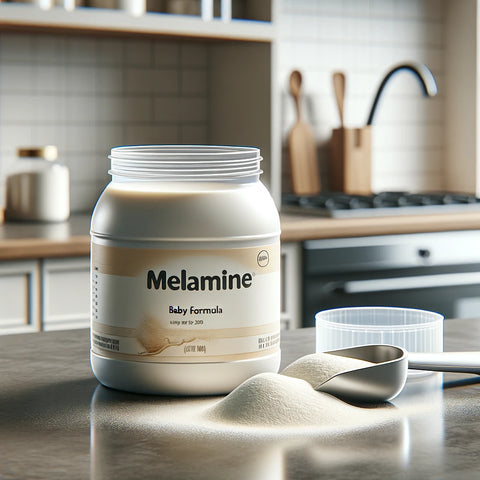In the landscape of parenting challenges, ensuring the safety of baby formula is paramount. Recent concerns about melamine contamination have added a new dimension to these challenges. Let's dive into what melamine is, its potential risks, and how parents can navigate this issue.
What is Melamine?
Melamine is a chemical compound used in a variety of industrial applications, including the production of plastics, adhesives, and laminates. It's important not to confuse melamine with melanin, a natural pigment in our bodies responsible for hair, skin, and eye color.
Melamine in Baby Formula: How Does It Happen?
Melamine contamination in baby formula is typically not a natural occurrence but a result of industrial negligence or adulteration. It has been found added to milk products to artificially increase the protein content. This illegal practice can lead to serious health issues in infants.
Recognizing the Signs of Melamine Toxicity
Melamine toxicity primarily affects the kidneys. Symptoms can include irritability, blood in urine, little to no urine output, signs of kidney infection, and in severe cases, kidney stones or renal failure. If you notice any of these symptoms in your baby, it's crucial to seek medical attention immediately.
Immediate Actions for Suspected Melamine Exposure
If you suspect your baby’s formula might be contaminated with melamine, the first step is to stop using the product and consult a pediatrician. A healthcare professional can provide guidance on testing and treatment. It's also advisable to report the product to the relevant food safety authorities in your region to facilitate broader safety checks and recalls if necessary.
Navigating Regional Risks
The risk of melamine contamination can vary by region, largely due to differing regulatory standards. Historically, incidents of contamination have been more prevalent in places with less stringent food safety regulations. While it's not practical to entirely avoid formula from specific regions, it is wise for parents to stay informed about product recalls and safety alerts, especially those concerning baby food and formula.
Can Parents Test for Melamine?
Currently, there are no straightforward home-testing methods available for detecting melamine in baby formula. The testing for melamine requires sophisticated equipment typically found in advanced laboratories. Therefore, the best approach for parents is to choose baby formula brands with a strong reputation for quality and safety, and to stay updated with news from reliable sources regarding product safety.
Key Takeaways for Parents
1. Be Informed: Stay up-to-date with safety alerts and recalls related to baby formula.
2. Choose Reputable Brands: Opt for formula from manufacturers with rigorous quality control and good safety records.
3. Monitor Your Baby: Watch for any unusual symptoms, especially related to urinary health, and seek immediate medical attention if concerns arise.
In conclusion, while the risk of melamine contamination in baby formula is relatively low, especially with products from reputable brands and strict regulatory environments, it remains a concern that parents need to be aware of. By staying informed, vigilant, and choosing high-quality products, parents can help ensure the safety and well-being of their little ones.
Mix Smarter!


